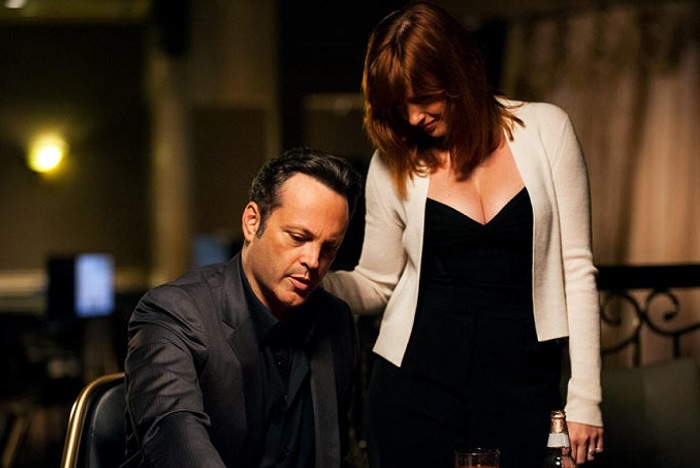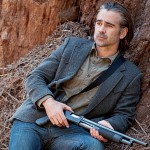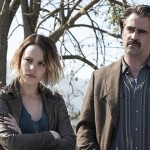
The repercussions of Stan's life (or lack of it) still reverberate in this week's episode. Whoever would have guessed that Stan, a character glimpsed so fleetingly, would become a narrative Sasquatch whose mystical footprint overshadows every man, woman, and child in Vinci?
Just kidding. Though we do learn a lot about Stan in this penultimate episode of True Detective. Actually we learn about a lot of shit. "Black Maps and Motel Rooms" is written with the density of your average Game of Thrones episode, just without the sense of economy. An episode full of rushed, yet major exposition dumps, it recalls almost any given final act of an Agatha Christie novel — as Hurcule Poirotzzatto elicits the assembled witnesses (in this case, his characters) into weaving together a tapestry made of the truth. Or at least a reasonable version of it.
I hate synopsizing this show because … Jesus Christ. The sheer overabundance of characters and disparate plot lines — like a network of metaphorical train tracks bending towards terminus — have been this season's biggest problem. And while they are coming together; the overstuffed nature of the story is really busting out at the seams.
Holed up in motel rooms, Ray, Ani, and Woodrugh begin to deal with the aftermath of the raid on Chessani's Fuckateria. The first order of business is to get anyone they care about out of town. For Ani that's her sister, Athena (Leven Rambin) and Deep Pop Chopra, Eliot* (David Morse). Woodrugh sequesters away his baby momma (Adria Arjona) and his actual mother (Lolita Davidovich). Ray doesn't have shit anymore so he's pretty much just on the job. But when he delivers the stolen contracts that lay bare the corruption in Vinci to their covert boss (Michael Hyatt) only to find her dead, the gravity of fucking with California's most rich and powerful men begins to set in.
Across town, Woodrugh (staring at a computer monitor with a brand of intense interest that only Taylor Kitsch can deliver) discovers that not only is Ani wanted for slicing and dicing the security guard at the fuck orgy, but also that the Vinci PD were complicit in the heist of those shiny blue diamonds during the '92 riots — and the double-murder behind them. The swift gears of retribution will grind our heroes to a pulp, if they are caught.
Frank, spiraling down a rabbit hole of screwed, learns that Caspere's murder was just a means of securing the diamonds and whatever cash he had (i.e. Frank's) to buy up Caspere's shares in the rail corridor deal for pennies on the dollar. Meanwhile premium Russian douche nozzle, Osip Agranov (Timothy V. Murphy) surreptitiously buys Frank's casino and club out from under him. Frank considers Jordan and himself officially on the run when he decides a scorched earth policy is the best policy — winning the Pizzolatto Line of the Week Award with, "In the midst of being gangbanged by forces unseen, I figured I'd drill a new orifice. Go on and fuck myself for a change."
Which eked out a win over the inexplicably worded, "Please articulate the percentage you would require to transact with me," when we learn from Frank that Jewish diamond brokers are easily manipulated out of their closely held religious tenets by a bigger cut of the loot. A little on the nose there, Pizzolatto. But, hey, Hasidic hitmen. Natch.
Everything feels a little out of place with this season: a wildly mixed bag of intermittently compelling execution, narcissistic writing, and the sense that Pizzolatto is biting off more than he can chew. There's a morbid curiosity to see if it all fits together into a satisfying whole. But everything that's wrong with this season is represented here in spades. Too many characters, convoluted machinations, and expedient coincidences. Seriously, between Ani's nearly forgotten missing-person turning up in a corner, Caspere's secretary "Laura" being the key to the diamonds, or Burris knowing just where Woodrugh would exit a vast series of underground tunnels … it's too much. And these are hardly the only examples of convenient writing meant to satisfy an already byzantine clusterfuck of plotlines.
It's a meandering saga that intends to become a new pop culture mystery; inspired, in part, by some corrupt and weird shit that probably really happened. That, like many things about True Detective, is admirably ambitious, and in some ways Pizzolatto is succeeding at making this show the best thing on HBO right now — mainly, because Ballers and The Brink suck. That and the cast that's keeping this ship afloat. Particularly Vaughn and Farrell, who often shine between the lazy clouds of Pizzolatto's stoned narrative. My investment up until this point has been in these characters. I actually care about Ray, Frank, and Ani. In fact, I'm starting to love Frank. But were it not for growing with them over these last seven episodes, I likely would have already given up on this mess of a James Ellroy pastiche.
The two best episodes this season are still the entries that share a co-writing credit. Pizzolatto, left to his own devices, is a mere mortal, after all. And that's fine. If this were the first anyone had ever seen of True Detective we'd likely be having a different reaction to it right now.
*I had him all wrong. He didn't molest Ani. He's just a sweet, deluded, and regretful NPC who loves his daughter.











